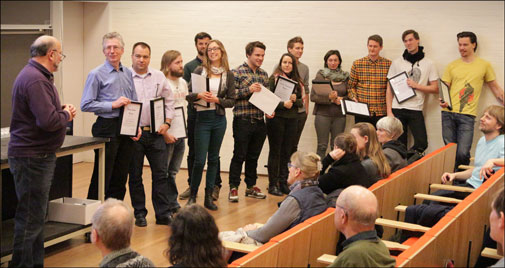Lab managers and instructors win this year’s Jens Martin Prize
The Niels Bohr Institute award for teacher of the year, the special Jens Martin Prize, has been awarded to a group of teachers: The lab managers and lab instructors for the courses Mechanics 1 and 2.

The Jens Martin Prize was awarded to a group of teachers this year: The lab managers and lab instructors for the courses Mechanics 1 and 2. Here they are being presented with their certificates by the Deputy Head of Institute for Teaching, Aksel Walløe Hansen at the annual Kick-Off event.
In the spring of 2013, a process was begun to restructure the mandatory laboratory course in the physics programme. No one thought that it would happen so quickly, but the group in charge was already ready with a brand new laboratory course for the start of the semester in September 2013, which was a marked transformation.
The students therefore nominated the Lab groups behind Mechanics 1 and 2 for their incredible efforts in restructuring the laboratory course, stating: “The team’s efforts have created a truly successful laboratory course that spans the first half year of the physics programme. The two laboratory courses are a model for laboratory courses for the rest of the compulsory courses, both in the way they develop the students’ skills and in the way they have collaborated, so that we now have a combined mechanics laboratory course.”
The groups consist of the lab managers, who are the technical director Børge Svane Nielsen and Professor Ian Bearden along with the instructors Jonathan Selsing, Annie Laura Borger, Willi Carlsen, Christopher Røhl Andersen, Esben Bork Hansen, Jophiel Wiis, Julius Bier Kirkegaard, Louise Dyregaard Nielsen, Jens Juel Jensen and Rosanna Ignazzi.
Significant restructuring
The restructuring is a significant change. All experiment instructions have been rewritten so that they have the same form throughout the course. The lab instructors and the lab managers have clarified the motivation behind each experiment and have highlighted which skills each student should hopefully acquire. Mechanics 2 is a natural extension of Mechanics 1 and the course has thus become more compact and integrated.
Students will be introduced to many of the aspects that they will continue to meet in the experimental work: log writing, simple data processing in Matlab, comparing data using different models, assessing uncertainties, uncertainty calculations, optimization of experimental setups, disproving/confirming hypotheses and the art of presenting one’s findings succinctly, clearly and understandably in writing.
Mechanics 1 and Mechanics 2 have managed to develop an example of how a good laboratory course should happen, thanks to a great effort from both the lab managers and lab instructors. The prize includes 10,000 kroner.
